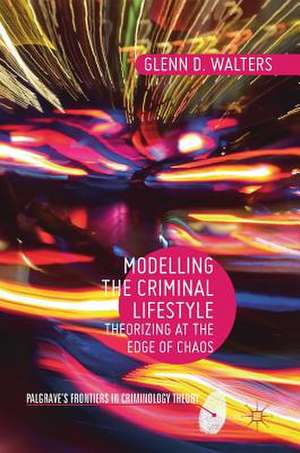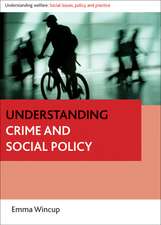Modelling the Criminal Lifestyle: Theorizing at the Edge of Chaos: Palgrave's Frontiers in Criminology Theory
Autor Glenn D. Waltersen Limba Engleză Hardback – 13 dec 2017
This book offers Walters's latest evolution of criminal lifestyle theory. It introduces the concept of criminal thought content to illustrate how the potential interplay between what offenders think and their thought processes can greatly aid our understanding of both crime and criminals. In this new study on criminal behaviour, Walters calls for criminological theory to be placed within a broader scientific context, and provides us with several key models which embrace constructs from numerous important theories including: the general theory of crime, social cognitive and social learning theories, general strain theory, psychopathic personality theories of crime, and labelling theory.
Another unique aspect of this work is that it places lifestyle theory within a larger scientific framework, namely, nonlinear dynamical systems theory or chaos. Seven principles from chaos theory are used to explain relationships and processes central to lifestyle theory and Walters uses this to draw conclusions on what affects criminal decision-making and desistance from crime. Highly original and innovative in scope, this book will be useful to practitioners and scholars of criminal justice alike, with chapters focussed on decision-making, assessment, and intervention.
| Toate formatele și edițiile | Preț | Express |
|---|---|---|
| Paperback (1) | 943.25 lei 6-8 săpt. | |
| Springer International Publishing – 30 aug 2018 | 943.25 lei 6-8 săpt. | |
| Hardback (1) | 948.47 lei 6-8 săpt. | |
| Springer International Publishing – 13 dec 2017 | 948.47 lei 6-8 săpt. |
Preț: 948.47 lei
Preț vechi: 1156.67 lei
-18% Nou
Puncte Express: 1423
Preț estimativ în valută:
181.49€ • 197.76$ • 152.93£
181.49€ • 197.76$ • 152.93£
Carte tipărită la comandă
Livrare economică 23 aprilie-07 mai
Preluare comenzi: 021 569.72.76
Specificații
ISBN-13: 9783319577708
ISBN-10: 3319577700
Pagini: 300
Ilustrații: XVI, 301 p. 24 illus.
Dimensiuni: 148 x 210 mm
Greutate: 0.53 kg
Ediția:1st ed. 2017
Editura: Springer International Publishing
Colecția Palgrave Macmillan
Seria Palgrave's Frontiers in Criminology Theory
Locul publicării:Cham, Switzerland
ISBN-10: 3319577700
Pagini: 300
Ilustrații: XVI, 301 p. 24 illus.
Dimensiuni: 148 x 210 mm
Greutate: 0.53 kg
Ediția:1st ed. 2017
Editura: Springer International Publishing
Colecția Palgrave Macmillan
Seria Palgrave's Frontiers in Criminology Theory
Locul publicării:Cham, Switzerland
Cuprins
Chapter 1. Tracing the Roots of Criminal Lifestyle Theory.- Chapter 2. Definitions and Major Assumptions.- Chapter 3. The Fractal Nature of Lifestyles.- Chapter 4. The Control Model of Criminal Lifestyle Development.- Chapter 5. The Moral Model of Criminal Lifestyle Development.- Chapter 6. Choice in a Criminal Lifestyle.- Chapter 7. Assessing the Criminal Lifestyle.- Chapter 8. Changing the Criminal Lifestyle.- Chapter 9. Criminal Justice Policy and the Criminal Lifestyle.- Chapter 10. Future Issues, Questions, and Concerns.
Notă biografică
Glenn D. Walters is Associate Professor of Criminal Justice at Kutztown University in Kutztown, Pennsylvania, USA, where he teaches classes on offender management, research methods, criminology, and substance abuse and crime. Dr Walters has published over 250 articles and book chapters and has authored or co-authored 18 books and edited collections.
Textul de pe ultima copertă
This book offers Walters's latest evolution of criminal lifestyle theory. It introduces the concept of criminal thought content to illustrate how the potential interplay between what offenders think and their thought processes can greatly aid our understanding of both crime and criminals. In this new study on criminal behaviour, Walters calls for criminological theory to be placed within a broader scientific context, and provides us with several key models which embrace constructs from numerous important theories including: the general theory of crime, social cognitive and social learning theories, general strain theory, psychopathic personality theories of crime, and labelling theory.
Another unique aspect of this work is that it places lifestyle theory within a larger scientific framework, namely, nonlinear dynamical systems theory or chaos. Seven principles from chaos theory are used to explain relationships and processes central to lifestyle theory and Waltersuses this to draw conclusions on what affects criminal decision-making and desistance from crime. Highly original and innovative in scope, this book will be useful to practitioners and scholars of criminal justice alike, with chapters focussed on decision-making, assessment, and intervention.
Caracteristici
Presents Walters's fourth evolution of lifestyle theory, introducing the concept of criminal thought content to advance our understanding criminal behaviour Offers sociologists and psychologists an alternative to traditional views on crime and offenders Includes relevant guidance for clinical and correctional psychologists, social workers, probation and parole officers, and court workers Includes supplementary material: sn.pub/extras Includes supplementary material: sn.pub/extras















